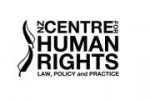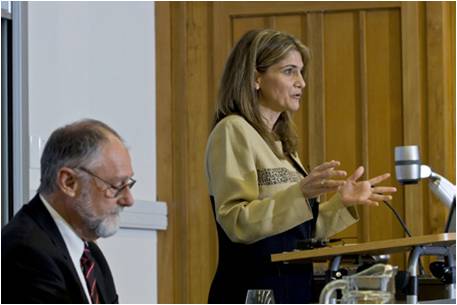Kill the Messenger: The Media’s Role in the Fate of the World
 The New Zealand Centre for Human Rights Law, Policy and Practice, (NZCHR) hosts numerous speaker events per year. Each speaker is from a respected human rights organisation and the events are open to the public.
The New Zealand Centre for Human Rights Law, Policy and Practice, (NZCHR) hosts numerous speaker events per year. Each speaker is from a respected human rights organisation and the events are open to the public.
About this address
These notes outline an address from Maria Armoudian, author of Kill the Messenger: The Media’s role in the Fate of the World and fellow at the University of Southern California’s Centre for International Studies, delivered 21 November 2012 at the University of Auckland, with Dr Gavin Gilles. Maria Armoudian also serves on the board of the Los Angeles League of Conservation Voters and is a host and producer of the Pacifica Radio programs, the Scholars’ Circle and the Insighters. This address delves into the main concepts of her 2011 book, investigating the media’s ability to both help and harm our society.
How media shapes perception & "group think"
Armoudian first outlined how the media interacts with psychological and cultural forces to impact our perceptions; how they are capable of enhancing cultural fears and encouraging and reinforcing peer-pressure and “groupthink” through the way that they frame issues. To illustrate her argument, Armoudian cited some thought provoking examples of real life studies such as the “Rattlers v Eagles” experiment and the “Stanford Prison Experiment.” These studies emphasised just how readily humans can be influenced to go along with the pack, even within a controlled environment.
 From this framework of theory, Armoudian then posed the question to the audience of whether the Media can be used as a force for good?
From this framework of theory, Armoudian then posed the question to the audience of whether the Media can be used as a force for good?
She proposed that the media environment in Nazi Germany and Bosnia can be seen as heavily influencing the atrocities that occurred in those countries at that time. She argued that these examples from our history illustrate the media’s sheer power to harm our society through its ability to dehumanize and villianize victims and create an environment of “group think” according to the agenda of whomever has power over the media.
Force for good?
But what of the force for good? Armoudian outlined a particularly salient illustration of the media’s effects with her discussion of the “twin” nations, Rwanda and Burundi, where the different approaches of the media correlated to either a tragic genocide, or the gradual healing of a country.
While Rwanda’s media followed the same homogenous pattern of places like Nazi Germany; Burundi had no ‘one voice’ in the media. Instead of inciting hatred and violence, the Burundian media created constructive rules; such as one Tutsi and one Hutu reporter having to collaborate on every story, and the creation of a forum where people could discuss their roles as bystanders in the war. Armoudian proposed that this example, among others, illustrates that when the media frames the issues a certain way, it can play a large part in helping our society. Instead of playing on a society’s fears of “us” and “them” the media has the power to help society see that there is only, “us.”
Paying heed to the 'spiral of silence'
Dr Gavin Ellis (Freedom of Expression Working Paper Series Editor, Lecturer in Politics at The University of Auckland and former editor of The New Zealand Herald) placed Armoudian’s comments in a New Zealand context. He warned us of our role to be mindful of the media, to speak out where we see injustices and polarization of the media, even though we may feel like such atrocities could never happen here. Armoudian added that even though we may feel like “it can’t happen here,” so too was the feeling in places like Bosnia and Chile. Ellis emphasised that we must always pay heed if a “spiral of silence” begins, where those who feel they are not in the majority often will not speak up. He commented that even if you feel as though you are in the minority you must speak to defend the freedom and objectivity of our media.
There followed a lively discussion during question time, where audience members asked questions around the role of the media in current society, especially touching on the failings of some of New Zealand’s major publications. Armoudian delivered some thought provoking answers, theorizing that once goals are defined about what it means to be a “successful” member of society then that sets the agenda for people’s behaviour. Armoudian proposed that If the ideal of what it means to be a successful journalist is to toe the line and be moderate then that is hugely influential; journalists are people too and often careerism trumps morality, especially in the profit model structure of most of today’s media corporations.
Listen to the Radio NZ interview (18 Nov. 2012): Maria Armoudian discusses neutrality and ethics in the media, including references to the BBC crisis in the wake of the Saville revelations, and the impact of right and left media in the USA.
Geraldine Burnett | Editor, New Zealand Centre for Human Rights, Law Policy and Practice Bulletin
More about the NZCHR
The New Zealand Centre for Human Rights Law, Policy and Practice was officially launched in January 2012. In October 2012 we featured its co-founder and inaugural Director, Kris Gledhill and in December 2012 highlighted the release of the first issue of a quarterly Human Rights Agenda .
Related sites of interest:
Related Thomson Reuters publications with Kris Gledhill